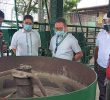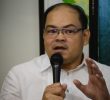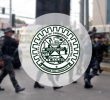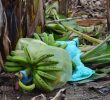by CHERYLL D. FIEL
Davao Today
Davao City — In a span of less than two weeks, the City council introduced, deliberated and approved a new liquor ban that prohibits business establishments from selling and serving liquors and other intoxicating substances starting at 1 am.
“This is what the mayor wanted. He wanted to expedite its approval for him to address the issue on maintaining peace and order,” Councilor Bonifacio Militar, proponent of the ordinance said in an interview with the media, minutes after a special session Wednesday, hammered the new law.
Militar said Mayor Rodrigo Duterte has frequently dealt with minors involved in such crimes that usually occur after midnight, hence he wrote the City Council last week on July 15 deeming the amendment to the liquor ban as urgent.
The council immediately passed the amendments on July 16 on its first reading. A week later, the council passed the ordinance, but it took a special session Wednesday as they ran out of time during their regular session on Tuesday.
Militar said, in all his 19 years in the council, this is the first time that an ordinance has been passed this fast in just a week’s time.
Militar clarified that due process was observed in the passage of the law which was expedited due to the mayor’s request. Even the Davao City Chamber of Commerce and Industry (DCCI) manifested their support of the ordinance, he added.
If the Vice-Mayor Paolo Duterte signs it today, the ordinance will be submitted to the Office of the City Mayor for approval. The ordinance shall immediately take effect three days posting in a publication for three consecutive times.
The ordinance seeks an earlier curfew of 1 am for the selling, serving and consumption of liquors, coco wine and other nature wine and other alcoholic beverages, instead of 2 am, stated in the previous liquor ban ordinance of 1994.
The ordinance also prohibits the consumption of intoxicating substances within business establishments and in other public places within curfew hours. These include, but are not limited to parks, plazas, parking areas, and uninhabited private places.
The amendment also exacts higher penalties for violators, such as a fine of P3,000 for first-time offenders; P5,000 fine and three-month imprisonment or both upon discretion of the court for second-time offenders; and a P5,000 fine, with imprisonment of one year upon determination of the court and revocation of business permit for third-time offenders.
Militar clarified that the ordinance is both administrative and criminal in nature. No person, he added, shall, however, be apprehended in violation of the ordinance, if no case has been filed in court.
The amendment also provides a clause on the handling of minors caught violating the law, where they shall be dealt with in accordance with the juvenile justice law.
Under the law Republic Act 9344 or the Juvenile Justice Welfare Act of 2007, a child 15 years of age or under at the time of the commission of the offense shall be exempt from criminal liability but will be subjected to an intervention program.
A child above 15 years but below 18 years, under the law shall also be exempted from criminal liability, unless he has acted with discernment, in which case he shall be subjected to appropriate proceedings.
There is, however, a pending proposal in Congress to amend the law wherein children, 12 to 15 years old who are proven to have committed a crime may now face imprisonment of not lower than one year. (Cheryll D. Fiel/davaotoday.com)
davao, davao city, duterte, liquor, liquor ban, liquor ban davao city, sin tax, smoking ban









